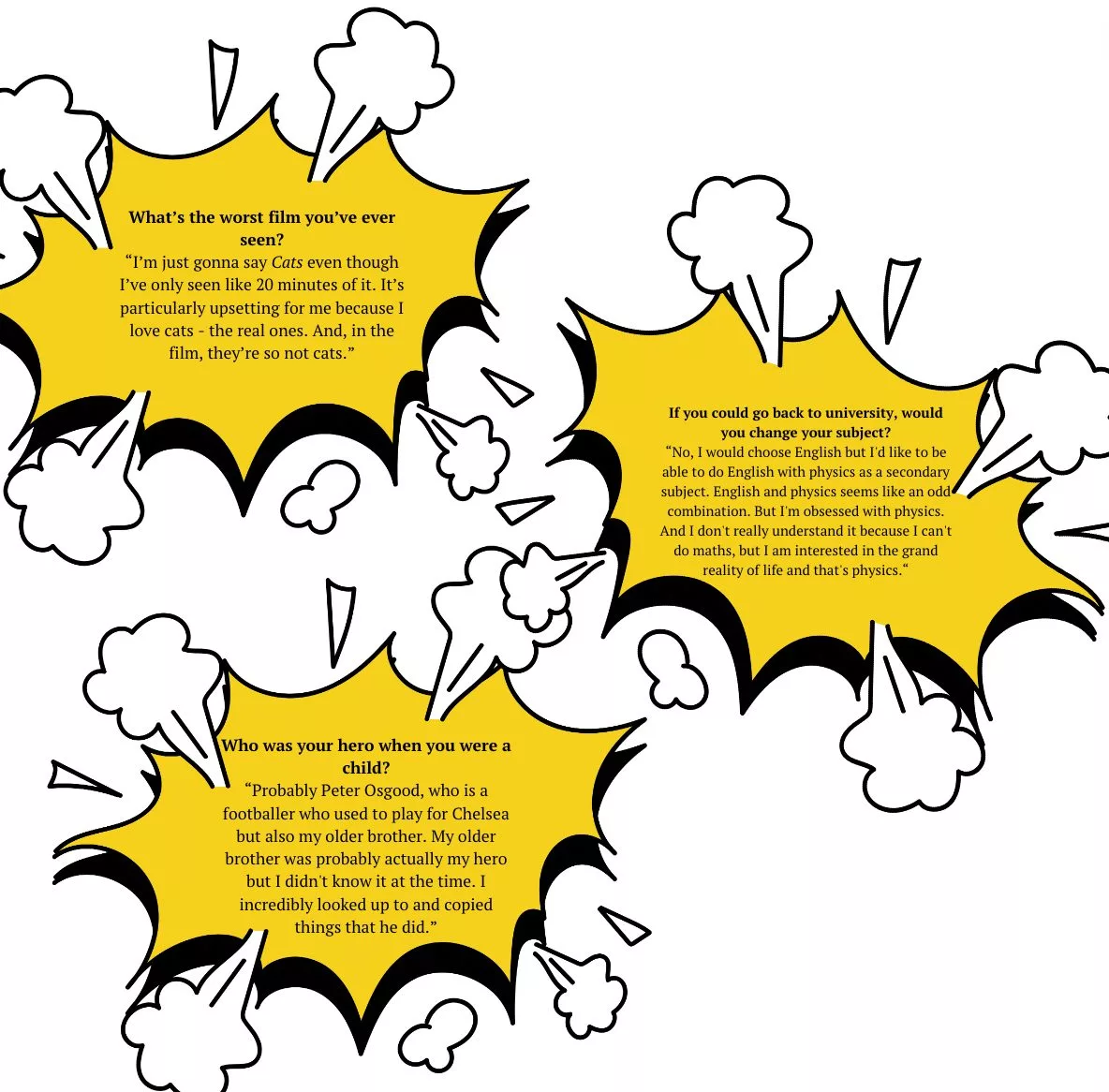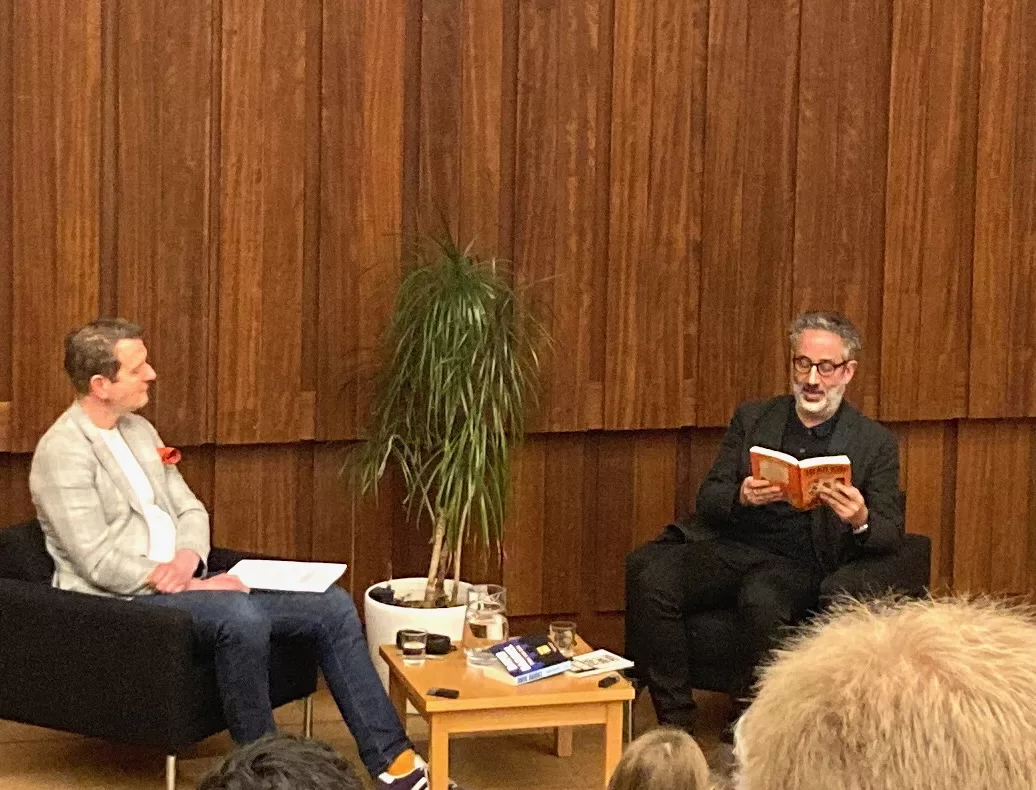David Baddiel gets asked a lot of questions. And, often, they’re all versions of each other: what was it like being the first comic to perform at Wembley? What’s it like being the voice of anti-anti-semitism for Britain’s comedy scene? Can you say ‘It’s coming home’ a few times? So, when he agreed to speak to Cherwell following his first lecture as Visiting Professor of Creative Media, we aimed for improv – where Baddiel is at his finest.
He may have the gift of the gab, but the comedian’s primary passion was football. David Baddiel was going to be a footballer. So, we started there.
The comic is known for going big. He was the first, alongside Rob Newman, to sell out Wembley Arena in 1993. Does his sizeable ambition toe the line of Macbeth’s? As far as men’s football is concerned, it still hasn’t come home. Not since Baddiel teamed up with Lightning Seeds and Frank Skinner with Number One, ‘Three Lions’ in 1996. Baddiel, though, is learning from those who have fallen from great heights.
What does he make of the Super League, that bizarre proposition to funnel billions of dollars of oil money into a football league made up, exclusively, of the most successful clubs in Europe?
“I don’t like the Super League. One of the last times I was active on social media about something that wasn’t about anti-semitism was being very anti the Super League. I think I might have written about it as well. Obviously the problem with the Super League, like a lot of sport, is the way that capitalism has gotten in the way of sport. I think of sport as something which should be unassailable in a way – even though lots of terrible stuff happens in sport and obviously, there’s a lot of sort of money in it.”
Then Baddiel demonstrates his career shift as he frames football in an ornamented, artistic one.
“At some level, the theatre of great sport is always brilliant, despite all the nonsense that always surrounds it. But then I thought that a Super League might finally crash that because the one thing sport has to have is some sense that ‘okay, this is an amazing game.’”
As Baddiel kindly reminds me, we can’t all be special. Unless, of course, you’re a comedian with a hit single and a double first from Cambridge.
“In The Incredibles, there’s a really extraordinary,” he pauses, “you know The Incredibles, right?” I did in fact know The Incredibles but I guess 2004 dates us – I should be flattered?
But, in The Incredibles, “a very interesting and unusual thing is said, which is that – what’s he called? Special Case?” He’s not; he’s called Syndrome. Though, Baddiel’s observation, for those who know The Incredibles, is apt.
“The villain, the boy, he wants to be special. There’s a climactic scene where Mr. Incredible says if everyone is special, no one is. Which is kind of an odd thing in a way to tell children who all want to be special, but that’s a harsh reality about life. I applied that to the Super League. If every game is Real Madrid vs. Man United, then there are no interesting games anymore because you’ve raised the bar to such a pitch where there’s no rhythm to it. So I was always very against it.”
Stadiums, arenas, creative intersections: Baddiel has gone big. Stewart Lee calls it the ‘Michael McIntyre effect’ – I guess a sort of Marmite for the comedy junkies. Having mentioned this, I get the machinations of a comic who really knows what he’s doing in return:
“I think Stewart Lee is the best comedian in Britain. Anything he says about other comedians is to do with his rage about him not being paid as much as say, Michael McIntyre, or whatever. But, yeah, it’s true that that arena comedy thing, which was started by me and Rob Newman – I agree with Stewart – I don’t think that’s the best space for comedy.”
Being suspicious of the Super League means being suspicious of big-space comedy. Baddiel favours the intimate – say, two black arm chairs and all black scenery to make a hostile interview a little bit more tight for air?
“The best space for comedy is a smaller room. I did the Lowry in Manchester on my last tour and saw Stewart Lee do the same room. 1200 people is probably the best number and 12,000 probably isn’t. You’re trying to create the illusion of talking individually to every member of the audience and obviously, the more people there are the harder that is. Having said that, I think comedians who play to bigger crowds like Michael McIntyre, even though he’s slagged off a lot by people like Stewart, are really good.”
Can’t we all be special, then? “There are some comedians that I don’t think that about,” Baddiel continues, “but unlike Stewart, I don’t like slagging off other comedians.” Hairs raised at the onset of a brewing Twitter storm.
You can rely on circuitous answers from the man of many talents. An interesting phenomenon, people and the media alike turn to the comedian for a perspective on the most pressing current affairs. I did. I asked why football is a flame which seems to have no death to the moth of racism.
“It was really, really awful when I was young. There was so much racism, of all sorts, and homophobia. It still remains an arena where there is ugliness. There was hooliganism at West Brom versus Wolves the other day like I haven’t seen for years.”
He suggests that this has something of the social media effect to it where profiles are crafted meticulously and obsessively. “I’m a Chelsea fan. But my identity isn’t really ‘I’m a Chelsea fan’. My identity isn’t ‘I’m a Jew’. I think identity is a nebulous, complex thing. Therefore, I can’t imagine any situation in which I would get up and shout in a way that I was defining my identity by opposition to someone else.”
Fans, the fanatics, will say “‘I’m a Chelsea fan’ but will define their identity by saying ‘I hate Tottenham’ or ‘I hate Arsenal.’ I don’t like football and Chelsea enough to say I hate something in order to make my own sense of identity bolstered. And that’s why there is horrible anger and racism and bad behaviour around football.”
There is, of course, the digital battlefield where the beast feeds. “On social media, you can be talking about all these hot political topics and then the minute there’s a football game, that is what trends on top.”
But, of course, nothing reaches the golden importance of a cat video on Twitter. I think it was made clear that cats are a rival to Chelsea in Baddiel’s self-identity.
“My dad was not an emotional man but the only place he showed any affection was to cats. We always had a cat. And so I think that created this sense of cosiness and reassurance around having a cat. I don’t feel at home unless a cat is there.”
The Beautiful Game has got nothing on what the comedian terms “the absurd, basic beauty of cats. I think they are the most beautiful creatures. I don’t think I’ve ever seen an ugly cat.”
Baddiel empathises. Cats are “stereotyped negatively in ways which aren’t true,” he says, smuggled in with a chuckle, “a bit like Jews.”
Whether it’s a result of needless Twitter baiting or protection of the memory of his father, “I’ve got an energy to try and make people understand that cats are not the stereotype of aloof, selfish, and, you know, standoffish that people think they are.”
Stewart Lee, cats, football – I sense that Baddiel likes a good ol’ bit of sparring or at least challenging what people think they know.
Indeed, as we parted ways, David asked, in true bitter, having-the-last-word, Cambridge fashion, “what actually is Cherwell?”



